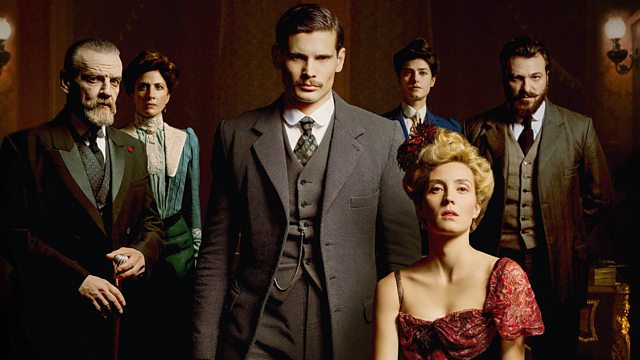Paris Police 1900 (Season 1, Episode 5)
One topic of our ongoing episode guides for Paris Police 1900 has been aesthetic and stylistic differences between European (in this case, French) television and American network television. I’ve said that the French series is grittier and more explicit because we see bare buttocks and naked breasts (albeit as part of a corpse).
A typical example might be the brutal police interrogation where Puybraud’s attack dog beats a false confession out of a man he knows is innocent of that crime by forcing him to put his hands on a table and then beating them with a chain. We don’t actually see chain strike flesh (nor have we since Psycho), but editors and cinematographers have become experts at montage editing and sound effects that allow us to experience more than we are actually seeing.
None of this is a particularly new observation and neither are some of the principles I will extract from them. The foremost is that ratings (for film or television) are archaic when they continue to be based on what is shown. The same scene might be viewed as PG-13ish if violence is “implied” — a stupid synonym for off-screen. The torture here is not implied — it is explicitly shown. It happens onscreen. It just happens in such a way that we don’t see the exact moment of the violence. This distinction is the difference between being sensitive to content and having a different sensibility. One can be (often should be) as disturbed by extended depictions of more graphic torture that are shot in a way where one’s sensibilities are shielded than by milder forms of violence that are shot/presented in a more graphic or explicit sytle.
Neither is it particularly profound to point out (again) that the differences I see between American network television and series such as these have more to do with stylization rather than volume. There are entire series, and entire genres of network television that revolve around violence. So, if I sense a difference, can I describe that difference?
One thing that makes the show feel grittier is not just the amount of violence but how pervasive it is. Literally, no one is immune from it, be she the wife of a spouse-beater or the wife of a police inspector. And while we’ve seen a man beaten in police custody, we’ve also seen a police inspector get beat up, shot at, threatened, what, at least three times (that I can recall) in five episodes. This observation suggests to me that the show is interested not just in individual acts of violence as a plot engine but also with violence as subject matter. What happens to a person who lives with constant violence? What happens to a society? If there is such a thing as PTSD and battered woman syndrome, is there such a thing as battered city syndrome? What are the corporate effects on all of us when anti-semitism, hatred, or violence reach a tipping point?
The answers to those questions are numerous and serious, so I’ll pick just one from the episode. Our souls and sensibilities become cauterized. We harden ourselves to that which used to horrify or disgust us. And we find ourselves rationalizing as necessary for survival things that we know are wrong. Pay close attention to the offending police officer (Fiersi) … the one who administered the beating to close the Berger case. He receives a reward, but he is clearly more motivated by fear than greed. The reward is a false sense of relative security from further violence. If he loses his position, he knows full well that he has no recourse against unjust violence.
This is also why the backstory of the Dreyfus affair is an important context and background and not just local color seasoning. The antisemitism league perpetuates individual acts of violence, but these pale in number and degree to what we don’t see. We understand them as representative examples of a pervasive problem that is touching (and corrupting) all parts of society. And, as we see in the example of the police officer, when violence becomes pervasive enough, the threats or anticipations of further violence are processed and felt very differently than they might be in a society where those acts are rare or exceptional.
What then do I hope to see in the last three episodes? As this is shaping up to be a show as much about setting as plot, I want to know if it is possible to address widespread cultural ills like violence, corruption, or antisemitism on a macro level or only a personal level. Historically, optimistic shows may be on the side of reformers, and films or shows that show corruption may suggest that the future will be brighter as the consequence of some noble individuals who are insufficient to stem the tide of the current moment but signal gradual changes for the better. (To Kill a Mockingbird is a classic example.) Other, more recent shows such as The Wire (or to some extent Game of Thrones) appear to me to suggest that flaws are inherent in the system and the best individuals can do is create small islands of resistance while remaining ineffective on the macro level of creating a better society. (I repeat again my observation that the title Paris Police 1900 signals the series is more interested in the macro than the micro.)
It’s not enough (for me) to note chilling parallels between Paris circa 1900 and western civilization circa 2022. I want the show to interrogate how the forces of fascism and antisemitism were addressed and beaten back on a macro level. Were they defeated only to reemerge in another generation? Did they win out (making this a pivotal moment)? Was it a stalemate, but the forces remained with us to be battled anew in each generation?

